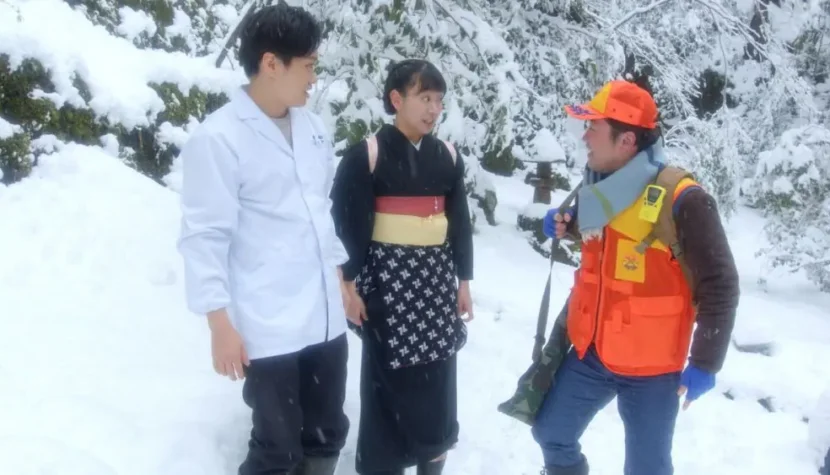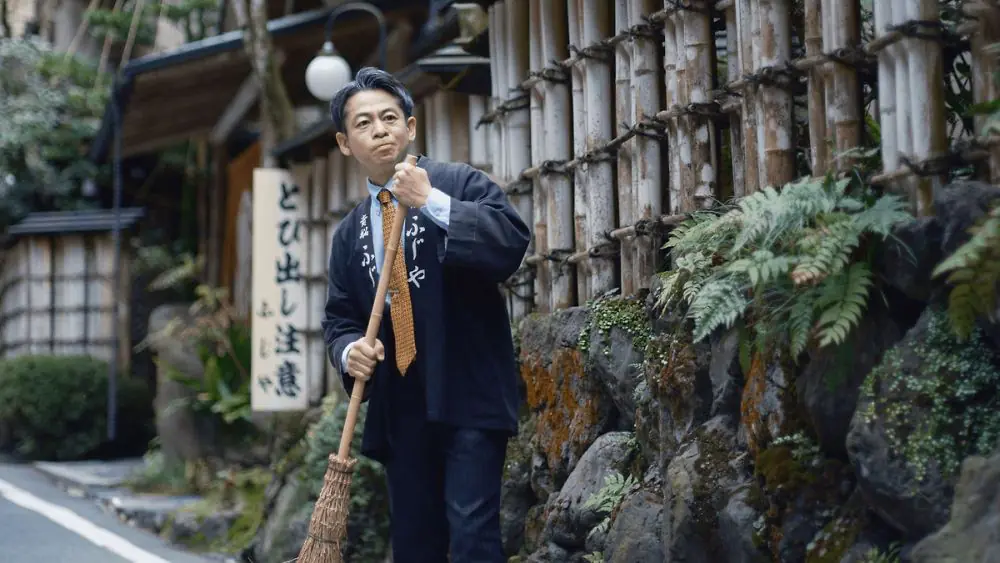RIVER. A humorous science fiction about a time loop

When the employees and guests of a provincial Japanese inn find themselves trapped in a time loop, only cooperation can save them from their predicament. Here’s “River”.
Fujiya, located in the picturesque town of Kibune, is one of many ryokan—traditional Japanese inns offering meals, lodging, and baths—nestled in the mountains north of Kyoto. On the surface, nothing unusual happens here: waiters and waitresses greet and farewell guests, serve dishes, and clear tables; two men enjoy okayu and sake; a writer struggles to finish his novel, and a bath enthusiast revels in the pleasures of the furo. During a short break, a young waitress, Mikoto, steps out by the river, then returns to help clean one of the rooms. Two minutes later, she’s back by the river, but upon returning to the inn, she finds the room she had started cleaning is once again in disarray. This cycle repeats every two minutes, and it soon becomes clear that Mikoto, along with the other staff and guests at Fujiya, are caught in a strange time loop. They must keep their cool and work together to unravel the mystery and escape the trap.

The film “River” (Japanese title: “Ribā, nagarenaide yo”, meaning “Don’t Flow, River”) is the second feature film by Junta Yamaguchi and a sort of sequel to his 2020 film “Beyond the Infinite Two Minutes”, where a café owner discovers his computer monitor shows events happening two minutes in the future. The two films share the same screenwriter (Makoto Ueda) and cast (including Masashi Suwa, Riko Fujitani, and Kazunari Tosa). The creators have noted that the time loop motif allowed them to make a low-budget film with a science fiction basis without needing costly special effects, while also providing an opportunity to “look at life from different perspectives.” Indeed, Yamaguchi’s film relies mainly on a precise script and acting skills—although “River” doesn’t rely on technological tricks, its execution is impressive: each two-minute sequence of time loops is filmed in a single take.
Perhaps the most famous film about a time loop remains Harold Ramis’s “Groundhog Day” (1993)—a comedy that subtly conveyed significant ethical and philosophical questions beneath its humor. “River” is crafted in a similar spirit: it is both funny and thought-provoking. The time loop is merely a pretext to observe human behavior and reactions in unusual circumstances. Some characters panic, others remain calm and try to figure out causes and solutions. Sometimes, arguments and scuffles erupt between the two camps, but since the action takes place in Japan, the characters eventually start cooperating, realizing that only by doing so can they break free from the endless cycle (a reflection of a society that banded together for reconstruction after the devastating 2011 tsunami, including yakuza members—a type of collaboration that might be hard to imagine elsewhere).

Despite its fantastical premise, “River” offers a highly realistic psychological portrayal of people’s behavior and attitudes in crisis situations. But it seems that Yamaguchi’s intent went beyond mere realism. His film appears to celebrate Japanese tradition, symbolized here by the ryokan Fujiya. Japan has a long and rich tradition of hospitality; in fact, it’s home to the oldest continuously operating hotel in the world—Nishiyama Onsen Keiunkan, founded in 705. Japan remains committed to preserving its unique culture, values, and identity, even in the face of advancing globalization and secularization. Although most Japanese claim to be non-religious, nearly 70% practice Shinto and Buddhist rituals. Today, Europeans may only envy the Japanese for their determination in preserving their civilization.

